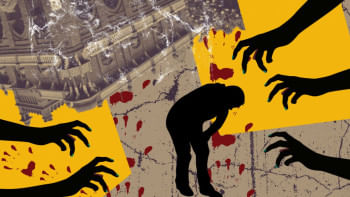The law is blind, but so are the people

In 1835, Lord Thomas Babington Macaulay laid down the framework for the Indian Penal Code, a legal system meant to be clear, comprehensible, and universal across the subcontinent. His vision was pragmatic: law should be a self-evident truth, requiring no special knowledge to understand. It should be, in essence, as obvious as the laws of nature. And yet, nearly two centuries later, the legal landscape in many "Third World" nations has become a confusing maze of incomprehensible statutes, selective enforcement, and mass disobedience.
Today, the reality of law in many developing nations, including Bangladesh, is anything but self-evident. Rather than being a respected pillar of civilisation, law often becomes an alien, distant force—feared, manipulated or outright ignored. Public beatings occur under the watchful eye of cameras, legal verdicts are swayed by corruption rather than justice, and police forces often act as enforcers of power rather than defenders of the rule of law.
How did this happen? How did Macaulay's dream of a transparent and rational legal system morph into a fractured, distrusted institution?
Jean-Jacques Rousseau, in The Social Contract, famously argued that laws are legitimate only when they stem from the general will of the people. However, in many developing countries, the law does not feel like a social contract; it feels like an imposition. Legal codes, drafted in colonial times or shaped by elites, are written in legalese so convoluted that even the educated struggle to grasp them. As British jurist Jeremy Bentham noted, "The power of the lawyer is in the uncertainty of the law." This uncertainty has bred a system where the common man feels alienated from the very institution that's meant to protect him.
Consider the phenomenon of mob justice, a manifestation of this alienation. If the law is perceived as distant, corrupt or ineffective, people take justice into their own hands. In recent months, viral videos have captured brutal street beatings across Bangladesh, where mobs—aware that they are being recorded—continue their violent acts unfazed. Why? Because the fear of legal consequences is absent. The legitimacy of law is undermined when its enforcement is selective, corrupt, or incompetent.
In his Theory of Justice, John Rawls emphasised that justice must not only be done but must be seen to be done. Yet, in many developing countries, justice is either unseen or glaringly absent. The powerful evade punishment with impunity, while the weak suffer the full brunt of a draconian legal system. This inconsistency erodes the very foundation of legal respect.
The adage "Justice delayed is justice denied" is nowhere more relevant than in the slow-grinding judicial systems of developing nations. Court cases often drag on for decades, sometimes outliving the accused and even the complainants. The legal backlog in countries like Bangladesh, India and Pakistan runs into the millions, leaving justice not only delayed but effectively denied.
Michel Foucault, in Discipline and Punish, argued that laws derive their power from their ability to discipline and surveil society effectively. However, when enforcement is inconsistent, the disciplinary function collapses. This is why a corrupt minister, despite glaring evidence, may walk free, while a poor labourer is jailed for a minor infraction.
Selective enforcement further fuels distrust. In many countries, the law is not an impartial force—it is a weapon wielded by those in power. Police forces are frequently accused of bribery, political allegiance, or outright lawlessness. Hannah Arendt warned against this in The Origins of Totalitarianism, where she noted that when legal institutions lose their integrity, they become mere instruments of oppression rather than justice.
Why do people in developing countries fail to respect the law? One possible answer lies in the psychological conditioning of the populace. In Authority and the Individual, Bertrand Russell observed that respect for institutions is cultivated through consistent and fair enforcement. If a system is consistently seen as unjust, people cease to regard it as legitimate.
In contrast, legal obedience in many Western democracies is not necessarily a result of harsher punishments but rather a deeply ingrained belief that the law functions as it should. When a citizen of Sweden or Canada receives a traffic ticket, they pay it not just because they fear punishment, but because they believe in the fairness of the system. In many developing nations, however, laws are often seen as arbitrary.
Furthermore, cultural narratives shape legal perceptions. In many "Third World" countries, the "hero" archetype is often someone who defies the system—a rebel rather than a law-abiding citizen. The celebration of outlaws in folklore, cinema, and literature reflects an ingrained scepticism towards authority. This narrative, reinforced over generations, makes it psychologically difficult for societies to develop an intrinsic respect for legal institutions.
One of Macaulay's core ideas was that law should be clear and self-explanatory. Yet, in most post-colonial countries, legal texts remain obscured in archaic, technical jargon. German Philosopher Jürgen Habermas, in The Theory of Communicative Action, argued that true democracy requires transparent, comprehensible laws that enable public discourse. But when laws are written in dense, colonial-era language, they alienate the average citizen, rather than empowering them, as they are unable to comprehend the legal talk.
Legal philosopher Lon L Fuller, in The Morality of Law, argued that the law is not just a set of rules but a reflection of a society's moral fabric. If people do not see morality in the law, they will not respect it. In many developing countries, laws are perceived not as ethical guidelines but as bureaucratic obstacles. The result is legal nihilism—where people follow the law only when convenient, and break it when they can get away with it.
The consequences of this are dire. When legal respect collapses, the rule of force takes over. The weak are left defenceless, and the powerful operate with impunity.
What happens when people lose faith in the legal system? The rise of "people's courts"—extrajudicial mobs delivering instant justice—is a disturbing trend in many areas. From lynchings in Bangladesh to vigilante killings in Latin America, these acts are not mere crimes but symptoms of a society that no longer trusts its judiciary.
Italian criminologist Cesare Beccaria, in On Crimes and Punishments, warned that when laws become instruments of oppression rather than justice, society will naturally rebel against them. This rebellion manifests not in political uprisings but in the daily disregard for legal structures—whether through bribery, mob justice, or outright anarchy.
In many ways, "Third World" societies are walking a precarious tightrope. The monster of lawlessness, once unleashed, is not easily contained. Macaulay envisioned a law that would be obvious and self-evident, but in much of the developing world, the law is neither respected nor feared—it is merely negotiated.
The legal crisis in developing countries is not just a governance problem, it is a moral and social one. As long as the law remains distant, selective and incomprehensible, it will continue to be ignored. And if that remains the case, the anarchy of the jungle will continue to reign.
H.M. Nazmul Alam is an academic, journalist, and political analyst. He can be reached at [email protected].
Views expressed in this article are the author's own.
Follow The Daily Star Opinion on Facebook for the latest opinions, commentaries and analyses by experts and professionals. To contribute your article to The Daily Star Opinion, see our guidelines for submission.

 For all latest news, follow The Daily Star's Google News channel.
For all latest news, follow The Daily Star's Google News channel. 










Comments